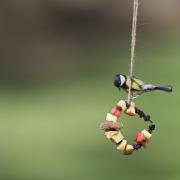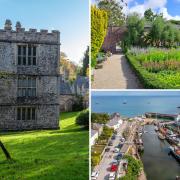A wartime hiding place for the Crown Jewels, Cornwall's Bodmin is steeped in a rich history so discover the darker side of its famous jail

Once Cornwall’s county town and a wartime hiding place for the Crown Jewels and the Domesday Book, Bodmin is steeped in a rich history and surrounded by unspoilt views, KIRSTY GRAY shares its darker side
Bodmin is the gateway to some of the country’s most unspoilt beauty and has many attractions. But for many visitors, the first stop-off is Bodmin Gaol. Crime, and how to deal with it, was one of the great issues of Victorian Britain. With an increase from about 5,000 recorded crimes per year nationally in 1800 to 20,000 per year in the 1830s, the Victorians had a firm belief in making criminals face up to their responsibilities and punish those who broke the law. So, between 1842 and 1877, ninety new prisons were built in Britain.

Cornish communities were separated from the mainstream of national Victorian life until the railway crossed the River Tamar at Plymouth in 1859. There were few roads to Cornwall and no track worthy of such a name when you arrived in the county. Travellers and freight had no alternative but to make risky, lengthy and uncomfortable coast-hopping voyages by sailing boat or steamer. The hardy Cornish, isolated, lacking in riches and wrestling poor livings by mining tin from the hills or netting the bounty of the sea, were ever outward looking, questing and fiercely independent.
Cornish communities were therefore no stranger to criminal activity due to the abject poverty of many of the county’s inhabitants. The prevailing view amongst magistrates at the time was that little would be tolerated so transgressions were severely punished.
Built in 1779 by prisoners of war, Cornwall’s historic jail at Bodmin saw a sudden increase in inmates around 1815, with the national crime wave at the end of the Napoleonic Wars.
Petty crime descended upon Cornwall, placing pressure on the overcrowded prison with inmates of Bodmin Gaol sentenced for minor crimes to suffer exceptionally harsh but often relatively short sentences; the local magistrates feeling comfortable with the notion that the short, sharp, shock treatment would be enough to teach would-be criminals a lesson.
Drunkenness on the streets was rife and considered disgusting, as was begging. Similarly, loose women were not tolerated, particularly in the more reformed Christian Cornish towns and villages. Local committees were formed with financial rewards offered to any citizen who turned in a miscreant or vagrant, with landlords being encouraged to keep a watchful eye out for any form of card playing, gambling or skittles.
Many men, women and children were caged in cells at Bodmin Gaol in desperately harsh and grim conditions, experiencing total isolation, terrible discomfort of a solid plank bed and a demeaning and meagre diet of bread and gruel, not to mention the deprivation of all previously known human privileges.
Sentences were passed for crimes that nowadays would rarely be investigated. For example, Ann Holman was convicted of stealing milk from a cow in Redruth and sentenced to two months in the cells at Bodmin. However, Ann was luckier than twenty-year-old Elizabeth Osbourne, who in 1813, set fire to a corn stack as she was jealous that her employer ate better bread than her. She was publicly hanged.
Bodmin saw more than 50 public hangings in the prison’s 150 years of operation, though only two since 1882; in 1901, Giovanni Valeri for murder at sea and in 1909, William Hampton from St Erth, for a crime of passion.
In the eighteenth and nineteenth centuries, public executions were not uncommon with tens of thousands of Cornishmen and women flocking from far and wide to witness the terrible ordeal of the condemned prisoners at Bodmin. If you stole an apple, some grain, a watch, a sheep or a horse, the hangman’s noose may well have sealed your fate. It made no difference, man, woman or child; if you broke the law, you were punished. Eight women were hanged at Bodmin between 1742 and 1901, four for the murder of their child or children.
In Victorian times, it was only murderers who found themselves taken to the gallows with eleven executions taking place between 1840 and 1909. In 1868, a major change in the law declared that executions must take place in private and so the hangings of Selina Wadge in 1878 for murdering her child - the unmarried mother-of-two killed her youngest son Harry on the promise of marriage - and William Bartlett in 1882 for murdering a child at Lanlivery, took place on the same site but shielded from view with a canvas screen. Only the 1901 and 1909 hangings were truly private.
Further information regarding the Victorian crimes in Cornwall can be found in newspapers of the day, often in great detail. Findmypast.co.uk is currently working with the British Library to digitise the newspapers they hold, and local newspapers are held on microfilm at the Cornish Studies Library in Redruth.
WE RECOMMEND...
Night time
Ghost Walk – Do you dare to spend the night in Bodmin Jail? Starting at 10.30pm, guests will be joined by a professional psychic medium who will lead group workshops in various areas of the prison.
The Hole in the Wall – An ex-debtors prison turned pub! A unique setting to enjoy a dink, with intriguing bits and bobs dotted around and a stuffed lion in the courtyard! Food is also available, along with local ales.
Eating
Red Lion Inn – Located in St Kew, the Red Lion Inn has a welcoming atmosphere suitable for all the family. Suitable for all appetites, stop by for a light lunch, or enjoy barbequed fish and tapas!
Folly Tea Room – Relax in this delightful little tea room in Bodmin. Enjoy a pot of tea alongside a traditional pasty or a homemade scone. Popular with locals, the tea room is great value for money. 3 Turf Street, Bodmin
Shopping
St Kew Harvest Farm Shop – Open since 2004, St Kew Harvest Farm Shop prides itself on selling local and ethical foods. The family owned shop grows with organic principles and now have an extended café as well as a commercial woodfired oven. The perfect place for foodies.
Clueless – Browse the beautiful Cornish glass creations at Clueless. The melted bottle art certainly caught our eye, whilst the wall art captured our hearts! Each item is handmade, and bespoke orders are available. Cluless.co.uk
THREE-MINUTE HISTORY



























